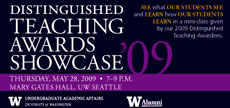 |
|||
| Undergraduate Academic Affairs Home | News | Make a Gift | UW Alumni | |||
|
April 2009 | Return to issue home
Meet the 2009 Distinguished Teaching Awardees
Each year, the University recognizes a small group of teachers through Distinguished Teaching Awards. Distinguished teaching runs deep and wide here and it is no small matter to highlight a few and not a few hundred. Those nominated all represent good, dedicated teaching—the unifying core of the undergraduate experience. Following are the 2009 Distinguished Teaching Awardees. If you didn’t take a class with them as a student, you have an opportunity to experience their teaching on May 28 at the Distinguished Teaching Awards Showcase, where several will give 20-minute mini-classes in the same way they teach current undergraduates. The Innovative Mentor As the sole Latino tenure‐track faculty member, his impact to students of color, particularly Latino students, is profound. He founded the Latino/a Social Work Student Organization and organizes the annual Latino/a Behavioral Health Conference, well past its fifth year. Paola Mizrahi, second year Master’s Social Work student, writes, “Professor Gino symbolizes what social workers’ integrity means in this convoluted and contradictory world in which it is easy to lose perspective. He is an extraordinary model on how to live and work holding and practicing the most precious values of humanity and how to share, teach and construct them together with his students, clients, and colleagues in a never ending commitment to social justice.” Susan Kemp, Associate Professor in Social Work, notes that Dr. Aisenberg “sets a very high bar for teaching excellence. His example stimulates me to improve my own teaching, and my courses are enriched by what his students bring with them from his classroom.” The Critical-Thinking Enforcer Jay Singh, a Political Science student, writes, “Professor Herbert adopts an approach to education that rejects the notion that teaching is the filling of empty vessels with vacuum packed, microwaveable packets of knowledge…[he] forces students to think critically for themselves….one experiences a sense of ontological dizziness and intellectual vertigo as long‐held beliefs fizzle under the hot lights of critical examination…when one leaves the confines of the classroom to rejoin the world beyond, one leaves fully equipped to confront issues of social injustice and empowered to make constructive contributions to broader society.” An Inspiration for Students and Professionals Department chair O. Ross Beirne writes, “Dr. Oda is an extraordinary educator respected and admired by dental students and professionals for her mastery of Oral Pathology, her nurturing spirit, and genuine commitment to learning. In my experience, her record of teaching effectiveness is unparalleled.” She has developed innovative teaching materials, stating that the best approach to teach her subject and engage students was to transfer her slides and other documents into electronic media regardless of the amount of time it took. In addition to furthering education in the classroom, the broader dental community benefits from her knowledge through her quarterly online newsletter and “Case of the Month” articles. Eric Caldwell, School of Dentistry student, writes, “Dr. Oda performs a feat that all instructors should aspire to. Her depth and breadth of knowledge are outstanding, yet she presents the information in such a way that makes her students want to pursue the subject matter. Hers is such a rare combination of attributes – many instructors impress with their brilliance or inspire with their delivery, but it is very rare indeed to excel at both.” A Creative Synergist Dr. Pittack is strongly committed in her continued professional development by participating in faculty workshops that emphasize topics such as ‘how to engage students in large classes,’ and ‘how to create better exams.’ Kate Mulligan, faculty colleague in the department, writes, “Cat cares deeply about teaching and being a good teacher, about the learning environment, about her students and how they learn, and about her colleagues. She seems to bring out the creative synergy in any group lucky enough to have her in it.” School of Nursing student Molly Tollefson, shares, “During lecture, Dr. Pittack assures that each and every student is engaged by utilizing clinical case studies. Giving students the opportunity to work in small groups and connect class material to clinical scenarios challenges us and goes a long way to cement knowledge.” A Teacher of Teachers A teacher of teachers, he has trained many cohorts of writing instructors who take on faculty positions at other institutions, making them better prepared than their counterparts trained elsewhere. His work has been recognized nationally: He was named one of the first Carnegie Teaching Fellows in 1998 for promoting the “scholarship of teaching,” to raise teaching to the same level of intellectual rigor and self‐reflective awareness that academics bring to their research activities. He currently serves as Director of Writing in the College of Arts and Sciences and before that, as Director of Expository Writing in the department. Professor Webster’s department chair writes that Professor Webster, “is a tremendously talented teacher himself, as inventive, as dedicated, as thoughtfully self‐reflective and as effective in the classroom as any teacher I have ever met. I think of myself as a very dedicated and highly effective teacher, and as someone committed to working toward ongoing pedagogical improvement personally, departmentally and institutionally. But my contributions to the educational mission of the University of Washington pale by comparison with John’s.” Junior Sara Lattimer, writes, “With every opportunity I have to learn from John Webster, I become more and more convinced that he is an unparalleled educator in a classroom setting. The first thing you learn sitting in a room with him is that you’re about to take a trip somewhere you’ve never been. There is a simplicity to his teaching style that belies the complexity of what’s really going on. It’s the sort of magic only found in the presence of a true master.” Sidebar: Come to the Distinguished Teaching Awards Showcase April 2009 | Return to issue home | |||
|
|||
